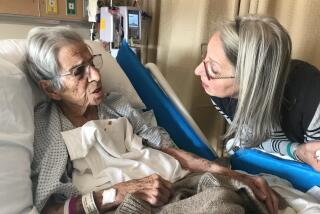Trauma Care Near Collapse, Doctors Warn
- Share via
SANTA ANA — Orange County’s once-renowned trauma medical network, now reeling from debt, will collapse within a year without a large infusion of cash, a panel of emergency medical experts warned county officials on Friday.
The doctors had been asked to advise the county on how to sustain the trauma network, which treats about 3,350 critically injured patients each year, after the Fountain Valley Regional Hospital and Medical Center closes its trauma center in December.
Instead, the doctors threw the Board of Supervisors a political curve. The remaining hospitals will not be able to keep offering highest-quality emergency medical care, they warned, unless the public is willing to pay for them.
Cigarette and alcohol taxes would be a good place to start, the doctors said. One physician suggested that law enforcement agencies hand over a share of the cash they seize from suspected drug dealers who sometimes require free medical care after drug-related violence.
Allowing the trauma center at Fountain Valley to close, the doctors said, will only put the other trauma centers on the critical list. The only real solution is to have the county reimburse the hospitals for at least the basic cost of indigent care, they said.
Fountain Valley is the third hospital in Orange County to drop out of the trauma network, which was touted as a national model at its birth in 1980.
Fountain Valley’s departure leaves only
two trauma centers--UCI Medical Center in Orange and United Western Medical Center-Santa Ana--serving populous northern Orange County where most of the county’s car accidents, shootings and stabbings occur. The county’s other trauma center, Mission Hospital in Mission Viejo, is too far to travel for most North County victims.
But UCI Medical Center and United Western Medical officials said Friday that they will not be able to absorb Fountain Valley’s patients indefinitely and noted that their trauma centers are also losing money. They blamed the high percentage of trauma patients who cannot or do not pay, as well as low reimbursements by the federal, state or county government.
Unless hospitals are adequately reimbursed for the care of the uninsured and the indigent, trauma centers and then emergency rooms will begin to close, the doctors said.
“The next step is that you dial 911 and nobody comes,” said Dr. Kenneth Waxman of UCI Medical Center. “Because if the emergency rooms aren’t taking people, the ambulance companies won’t come. That’s happening in L.A. County already.”
That grim scenario was presented at Friday’s meeting of the Orange County Trauma System Task Force, which includes the directors of the four trauma centers as well as emergency medical specialists and administrators at other major Orange County hospitals.
“The people in this room are not given to exaggeration,” said Dr. William Randolph Hardy, director of the trauma unit at Western Medical. “We’re trying to send a message to the county that whatever the critical level of funding is, we’ve slipped below it.”
Robert Bade, medical director of the county’s emergency medical services division, had originally appointed the panel and asked the the doctors to recommend administrative solutions that would not cost money. But he did not dispute the doctors’ conclusions Friday.
“There may be as much as a year of slack in there, but the ice is real thin, and it’s making cracking sounds,” Bade said.
The doctors did not give an estimated price tag for bailing out the trauma network. But Hardy estimated that the three North County trauma centers have together lost at least $5 million last year. “This year I’d be surprised if it isn’t twice as much,” he said.
In all, United Western Medical Center estimates that it collected only 55% of its bills in the past year, down from 65% last year, Hardy said.
“One more year of a drop like that will certainly put us under,” he said. “I predict the whole system failing no later than a year from this date.”
The financial plight of Orange County trauma centers is only one symptom of a deepening crisis in the nation’s health care system, said Dr. Kym Salness, director of the Emergency Department Faculty at UCI Medical Center. Budget cuts at the federal, state and county level are in fact forcing hospitals to cut back services for the poor, he said.
“The burden should be on the politicians who have cut millions, maybe billions for health care to admit that they’re rationing care” to those who can’t pay, Salness said. “This trauma meltdown is nothing more than a symptom of the indigent care crisis.”
Salness estimated the total unfunded cost of hospital care for the poor and uninsured and Medi-Cal and Medicare patients in Orange County as at least $100 million a year. That figure does not include the roughly $43 million the county already provides though Indigent Medical Services.
Among the ideas by task force members for resuscitating the trauma centers:
- Make every trauma patient eligible for county health funding if he has no other form of insurance, UCI’s Waxman proposed. The trauma insurance system would be administered by Indigent Medical Services but would have to have its own budget. Hospitals and doctors would be compensated at cost, with the payments to be negotiated.
- Use some of Orange County’s $19-million share of the new tobacco tax to compensate the trauma centers for this year’s losses, until the long-term county insurance system can be put in place.
- Impose tougher motorcycle helmet ordinances to reduce head injuries.
- Enforce stiffer alcohol penalties. More than half of all trauma patients are intoxicated, doctors said.
- When trauma centers become dangerously overcrowded, declare emergencies and deputize providers to avoid liability, thus allowing centers to stay open that would otherwise close their doors.
More to Read
Sign up for Essential California
The most important California stories and recommendations in your inbox every morning.
You may occasionally receive promotional content from the Los Angeles Times.













